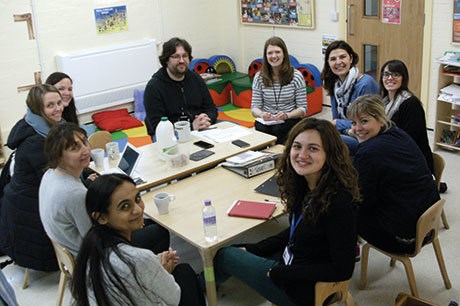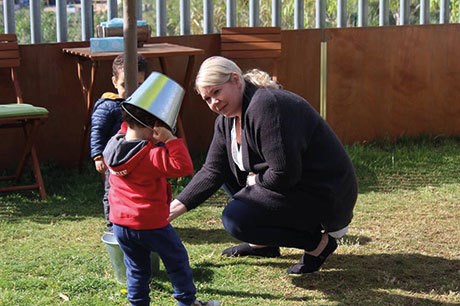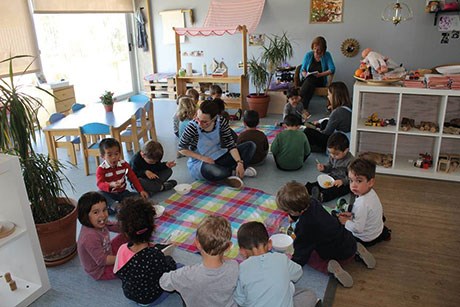Nursery Management: Staff Development - Shadow role
Annette Rawstrone
Monday, March 19, 2018
Job-shadowing in settings both at home and abroad can be a great way to share best practice, reflect on one’s own way of doing things and encourage CPD. Annette Rawstrone reports

Download the pdf of this article
Observing children is intrinsic to an early years practitioner’s role, but how often do you have the chance to take a step back and observe a fellow professional?
Job shadowing is a way of getting an insight into another setting, which can trigger new and improved ways of working once a practitioner gets back home.
For example, it plays a central role in the ToWe (toddlers well-being) Project – an EU-funded project to improve the practice of early years practitioners working with disadvantaged toddlers – to enable practitioners from England, Norway and Spain to learn from each other.
Last year, two practitioners from each partner country spent five days in each other’s settings, during which time they:
- received a taught session on the country’s educational system and curriculum
- observed practice to gain a better understanding of the provision and how practitioners are supporting toddlers’ well-being
- had the opportunity to discuss and reflect upon what they had observed, including comparing and contrasting the ways of working and strategies developed to support toddlers’ well-being.
Helen Sutherland, senior lecturer in early years at Kingston University, which is a partner in the project, says, ‘While the culture, politics, economics and curriculum of early years is very different within each country, the job shadowing enabled the early years practitioners to learn from each other’s settings, discovering the differences in provision and practice, and seeing the similarities.’
She believes that a collaborative approach is important for creating an open dialogue to improve practice and that job shadowing is a cost-effective way of continuing professional development. Ms Sutherland adds that practitioners do not have to travel abroad to see different approaches but simply spend a day observing colleagues in another room or visiting a local setting, then reflecting, discussing and sharing what has been observed.
‘Sharing experiences, questioning, reflecting and comparing are all enriching for practice and are good skills to bring into everyday work once you recognise the importance of it,’ she says.
EXTERNAL VIEW
Mireia Miralpeix Anglerill, from Escola Bressol Mas Balmanya in Spain, hosted visitors and job shadowed at early years settings in Norway and England, including Barnes Children’s Centre, run by Achieving for Children, as part of the ToWe project. She found it a ‘rich experience’ that has helped her to reflect on her practice. ‘People can explain how they work, but I feel seeing the way they work is most important,’ she says.
‘In Norway the work carried out outdoors was extraordinary. The children had the open-air area very well integrated, no matter what the weather was like, rain or cold, everything had been prepared to help them discover the changes in weather outdoors. Another thing that drew our attention in Norway was their confidence in the children, who are given the possibility to choose, and we could see that as they grow older they make important decisions autonomously and responsibly.’
 In the UK, she observed how staff welcome families into the setting and make them feel at home.
In the UK, she observed how staff welcome families into the setting and make them feel at home.
‘Having visitors was also important – watching the way they stayed with the children and talked and played was very helpful because we are used to one way of working. Rather than standing up, we saw people sit and talk to the children and understood that we needed to change our way,’ says Ms Miralpeix Anglerill. ‘You are learning too from being observed and the feedback is very helpful.’
GIVING FEEDBACK TO STRANGERS
Janette Barber, from Heathfield Children’s Centre in Twickenham, felt apprehensive before her job-shadowing visit to two settings in Spain because she was not used to giving feedback to fellow professionals. ‘I feel it’s a big responsibility to observe someone’s practice and there’s a skill in observing and giving good, fair and accurate feedback that can help someone to develop better practice and also recognise what is good,’ she says.
 The job-shadowing opportunity enabled Ms Barber to get fresh inspiration; for example, not relying on the spoken word when working with families with English as a second language and using more visuals and objects of reference. ‘The adults were speaking and singing in Catalan, Spanish and English in age-appropriate language using key words to reinforce learning. As I sat, observing and listening, I reflected that if I stayed in this environment, I too could learn language,’ she says.
The job-shadowing opportunity enabled Ms Barber to get fresh inspiration; for example, not relying on the spoken word when working with families with English as a second language and using more visuals and objects of reference. ‘The adults were speaking and singing in Catalan, Spanish and English in age-appropriate language using key words to reinforce learning. As I sat, observing and listening, I reflected that if I stayed in this environment, I too could learn language,’ she says.
Being asked questions about her practice was also helpful because it made her reflect on it.
Despite both settings being in Catalonia, Ms Barber noted how different they were and how much they could share and gain from each other, ‘which highlighted to me that you do not have to go abroad to widen your perspective’. She adds, ‘The experience demonstrates that it is possible to build trusting, professional, respectful working relationships with teams outside of our immediate teams by inviting peer observations within our organisations and with local settings.’
Following her positive job-shadowing experience, Ms Barber has the following advice:
- Don’t be worried that you or your setting isn’t perfect – it is an opportunity for growth and reflection for both the visitor and host.
- Before job shadowing, set out clear objectives about what are you seeking to observe and what the visitor and host hope to gain from the experience. Set boundaries; for example, are you allowed to interact with the children while job shadowing?
- It may be helpful to ask yourself: What is it like to be a toddler here? What is it like to be a practitioner here?
- Use a notebook to record your observations when they are happening to aid recall.
- Remember professional ethics and, even though you have been invited to give feedback, don’t hurt anyone’s feelings. Be open, honest and respectful.
- Discuss your observations to find out more – be curious, don’t make assumptions and don’t judge. Ask for clarification or explanation if you are not sure about what you have observed.
- If they do things differently, find out why.
- Be clear about how you are going to give or receive feedback. Is it going to be formal or informal, private or in a group?
- When giving feedback it can be helpful to think of your role as a critical friend.
- Use the two stars and a wish strategy; for example: say two things that were good and one thing that could be improved.
- Look for positives and give praise where you can, it’s a great motivator.
HOW TO MAKE LINKS
1. Don’t be afraid to contact settings when you hear of good practice and ask to visit – it’s flattering to be asked
2. Contact local universities and find out if there are any projects you could get involved with
3. Join a professional organisation to gain networking opportunities
4. Instead of seeing local settings as competition, build relationships with them and share good practice
5. Ask to visit other nurseries in your organisation or job-shadow colleagues in other rooms
6. The British Council currently offers ‘eTwinning’ opportunities for early years settings: https://www.britishcouncil.org/etwinning

HIGH HOUSE DAY NURSERY, BISHOP’S STORTFORD
Being a forerunner in introducing the Reggio approach led to nursery director Vanessa Callan being contacted by many people wanting to observe practice at High House. Over the past 10 years, it has hosted practitioners from around the UK and the world and staff have been able to job-shadow in other settings. ‘My advice to others is to see as many nurseries as you can. If one good thing comes from it then it is worth the money. I share ideas but equally gain ideas from others,’ says Ms Callan.
‘I think it’s important to visit other settings with a completely open mind. Interact with the staff team and get on to the children’s level, smile and ask lots of questions. Try to become part of the nursery rather than just a bystander on the side with a clipboard.
‘When I visited a nursery in Poland we were treated just like a team member and given the same meal as the children, which inspired us to change our menus.’
Staff and children gain from hosting visitors who share new ideas, praise and validate practice and introduce them to different languages and cultures, such as a group of teachers from Norway who put on a play. ‘It was amazing to see other practitioners with a completely different language being able to interact with our children as well as anyone else,’ Ms Callan says.
Job shadowing enables staff to feel part of a larger community. ‘We discuss practice with visitors and talk about paperwork and that changes are happening and we’re being more regulated and having to do more observations and tracking,’ says Ms Callan.
‘It’s interesting to see that the world is changing as well as the country.’
FURTHER INFORMATION
ToWe, www.toddlerswellbeing.eu





